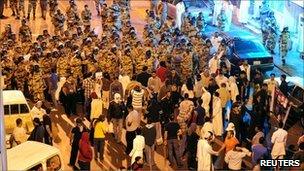Amnesty: Saudi terror law 'would strangle protest'
- Published

A secret new anti-terror law being drawn up by the Saudi authorities would "strangle peaceful protest", Amnesty International has said.
The BBC has been shown a classified copy of the draft law showing a number of measures Amnesty said would severely restrict human rights.
These include lengthy detention without trial, restricted legal access and increased use of the death penalty.
But a Saudi official said it was directed at terrorists, not dissidents.
The Saudi government has so far declined to comment, but the senior official, who did not want to be named, confirmed the existence of the draft law and did not dispute the clauses contained in it.
A human rights group in Saudi Arabia has told the BBC that it will try to organise a petition to King Abdullah to change the law.
Incommunicado detention
"[The law] will give an open hand for the minister of the interior to do whatever he wants to do. Basically he will be controlling the judiciary, controlling the public prosecutor, he's in charge already of the prison system, and there is no way to get a fair trial," the head of the Saudi Civil Rights Association, Mohammad al-Qahtani, told the BBC.
He said he would be trying to mobilise influential members of Saudi society to produce a petition to the King to improve it.
Amnesty International's Middle East press officer James Lynch told the BBC the draft law - a copy of which was leaked to the human rights group - "seeks to entrench some of the most repressive practices that Amnesty has been documenting for years".
Among the measures proposed is a broadening of the definition of a terrorist crime to include any action deemed to be "harming the reputation of the state" or "endangering national unity".
'Crushing dissent'
Suspects could be held incommunicado for up to 120 days - longer if authorised by a court - and there would be restrictions on access to legal advice.
Violations of the law would carry harsh punishments, with the death penalty applied in cases of taking up arms against the state or for any "terrorist crimes" that resulted in death, said Amnesty.
Questioning the integrity of Saudi Arabia's rulers would become an offence punishable by a minimum of 10 years in prison.
Amnesty said a number of provisions in the document contradicted the kingdom's legal obligations, including the UN Convention against Torture.
Philip Luther from the charity said the law would be a serious threat to freedom of expression in Saudi Arabia in the name of preventing terrorism.
"If passed it would pave the way for even the smallest acts of peaceful dissent to be branded terrorism and risk massive human rights violations," he said.
The BBC's Frank Gardner says Saudi Arabia has fought and largely won a protracted battle against al-Qaeda-inspired terrorism in recent years.
But the gist of Amnesty's criticism is that parts of the new draft law are more aimed at crushing political dissent than locking up dangerous terrorists.
- Published28 June 2011
- Published21 June 2011
- Published29 June 2011